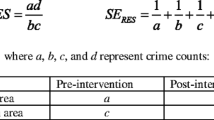Abstract
Services of mental health and related agencies have been subjected to extensive criticism in recent years. Reformers have suggested that agencies should place more emphasis upon prevention, outreach, and crisis-oriented services and that more use should be made of planning, research, and citizen contributions. Insufficient attention has been given, however, to staff attitudes toward these reforms to ascertain whether they favor or oppose them. Policy orientations of 167 top executives are utilized to develop a methodology and theory for analyzing reform activity within human services agencies.
Similar content being viewed by others
References
Chu, F., and Trotter, S.The Madness Establishment. New York: Grossman, 1974.
Cofer, C. N., and Appley, M. H.Motivation: Theory and Research. New York: Wiley, 1967.
Cupps, S. D. Emerging problems of citizen participation.Public Administration Review 37: 478–487, 1977.
Davis, H. Change and innovation. In: Feldman, S., ed.Administration of Mental Health Services. Springfield, Ill.: Charles C. Thomas, 1973.
Huse, E. F.Organization Development and Change. St. Paul: West, 1975.
Janis, I. L.Victims of Groupthink. Boston: Houghlin-Mifflin, 1968.
Janis, I. L., and Mann, L.Decision Making. New York: The Free Press, 1977.
Jansson, B., and Taylor, S. Search activity in social agencies: Institutional factors that influence policy analysis.Social Service Review 52: 189–201, 1978.
Jansson, B., and Taylor, S. The planning contradiction in social agencies.Administration in Social Work 2: 171–181, 1978.
McGuire, W. J. The current status of cognitive consistency theories. In: Feldman, S., ed.Cognitive Consistency. New York: Academic Press, 1966.
McGuire, W. J. The nature of attitudes and attitude change. In: Lindzey, G., and Aronson, E., eds.The Handbook of Social Psychology. Reading, Mass.: Addison-Wesley, 1969.
McGuire, W. J. The yin and yang of progress in social psychology.Journal of Personality and Social Psychology 26: 446–456, 1973.
Perlmutter, F. D., and Vayda, A. M. Barriers to prevention programs in community mental health centers.Administration in Mental Health 5: 140–153, 1978.
Rokeach, M.The Nature of Human Values. New York: The Free Press, 1973.
Seligman, M. P.Helplessness. San Francisco: Freeman, 1975.
Selznick, P.Leadership in Administration. New York: Harper & Row, 1957.
Staw, B. M., and Ross, J. Commitment to a policy decision.Administrative Science Quarterly 23: 40–65, 1978.
Waldo, D.The Administrative State. New York: The Ronald Press, 1948.
Watson, G. Resistance to change.American Behavior Scientist 14: 745–766, 1971.
Weinstein, A. G., Predicting behavior from attitudes.Public Opinion Quarterly 36: 355–360, 1974.
Zaltman, G., and Duncan, R.Strategies for Planned Change. New York: John Wiley & Sons, 1977.
Zaltman, G., and Lin, N. On the nature of innovations.American Behavioral Scientist 14: 651–673, 1971.
Additional information
This research was partially funded by the Faculty Research Fund of the University of Southern California. The author acknowledges the collaboration of Professor Samuel H. Taylor in data collection. Bruce S. Jansson is Associate Professor at the School of Social Work of the University of Southern California.
Rights and permissions
About this article
Cite this article
Jansson, B.S. Policy dissonance and executive preferences: Implications for reform. Administration in Mental Health 7, 175–186 (1980). https://doi.org/10.1007/BF00820520
Issue Date:
DOI: https://doi.org/10.1007/BF00820520




